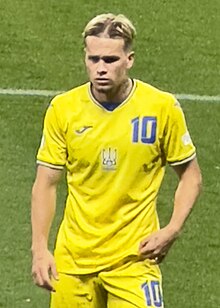Article body analysed
Chelsea's Mykhailo Mudryk has been provisionally suspended after returning an adverse finding in a drugs test. The Blues winger has tested positive for Meldonium, a banned metabolic substance similar to insulin, used to enhance endurance. His failed test was discovered after a routine urine sample on international duty with Ukraine in October. Mudryk is still waiting on the result of a ‘B’ sample and whether or not it confirms the findings of his ‘A’ sample. Meldonium is the same substance tennis legend Maria Sharapova tested positive for at the Australian Open in 2016. The five-time Grand Slam winner was initially banned for two years - although it was later reduced to 15-months. That was partly because the performance-enhancing drug had only recently been added to the World Anti-Doping Agency’s prohibited list as of January 1, 2016 - 17 days before the Open. Russian Sharapova revealed she had taken meldonium since 2006 for health problems and was allowed to return to tennis in January 2017. The limited-market pharmaceutical is an anti-ischemia medication - which aims to increase blood flow to a part of the body. According to USADA (the United States Anti-Doping Agency), Meldonium is typically used clinically to treat heart conditions. For athletes, it assists with endurance and the capacity to recover from exercise by using oxygen sparingly and quickly restoring energy. Meldonium is only prescribed in parts of Eastern Europe and is not approved for use by the Food and Drug Administration (FDA) in the United States. talk SPORT host Simon Jordan reacted to the history of Meldonium in sport following the confirmation of Mudryk's adverse finding. He told talk SPORT's White & Jordan: "Meldonium which is the same substance that Maria Sharapova got herself banned for which deals with ischemic issues, that deals with blood supply, and is only manufactured in the Baltics and in Latvia. "It's a substance that has had history previously and has obviously been banned as a substance hence the reason why it's a challenge. "So there it is. That's the substance and it is used, and has been used by athletes in the past. "Sharapova used it apparently because she had a magnesium deficiency, but she got herself banned as a result of it. "So, yes This drug has form and has athletes in other sports that have had consequences attached to them as a result of it. " Mudryk, who cannot play until his situation is resolved, has reacted to the news on social media, where he stressed he is a clean athlete. Taking to Instagram, he said: "I can confirm that I have been notified that a sample I provided to The FA contained a banned substance. "This has come as a complete shock as I have never knowingly used any banned substances or broken any rules, and am working closely with my team to investigate how this could have happened. "I know that I have not done anything wrong and remain hopeful that I will be back on the pitch soon. "I cannot say any more now due to the confidentiality of the process, but I will as soon as I can. " Sharapova admitted she had Google meldonium because she was only familiar with its trade name Mildronate and wasn't aware it was banned. "I didn't even know what meldonium was, " she told the Times. "I had to Google it to find out. To me, it was Mildronate. " In her autobiography, Sharapova wrote: "I had failed the drug test. How? What the hell could it be? I took nothing new, nothing that was not legal and prescribed by a doctor. It was called meldonium. OK, obviously this was a mistake. Who had ever heard of that? I Googled it, just to make sure. "Then I understood. I knew meldonium as Mildronate, the brand name. It was a supplement I’d been taking for 10 years. It’s an over-the-counter supplement in Russia, so common that you don’t think of it as a drug, let alone a performance-enhancing one. "I’d first been told to take it when I was 18 and getting sick a lot; I had an issue with irregular heartbeats. For seven years, I had written confirmation that all the supplements I was taking, including Mildronate, were permissible. "As of January 2016, meldonium was included in a catalogue of banned substances that the ITF sent out to players. It was viewable by clicking through a series of links in an email. I never followed those links, and didn’t ask any of my team to. That was my mistake. But the ITF didn’t draw any attention to the fact that they were suddenly banning a supplement that was being legally used by millions of people. That was their mistake. "I felt trapped, tricked, but I figured all I had to do was explain myself. Meldonium had been banned for four weeks. At worst, I had inadvertently been in violation of the ban for less than 28 days. "But I soon realised I was running into a brick wall. If I failed to win my case, I could be banned for up to four years. It would be the end of my career. " © 2024 talk SPORT Limited
Registered in England No. 2806093. Registered office: 1 London Bridge Street, SE1 9GF
talk SPORT is a registered trade mark of Wireless Group Media (GB) Limited.
This service is provided on talk SPORT Limited's Terms of Use in accordance with our Privacy & Cookie Policy.
